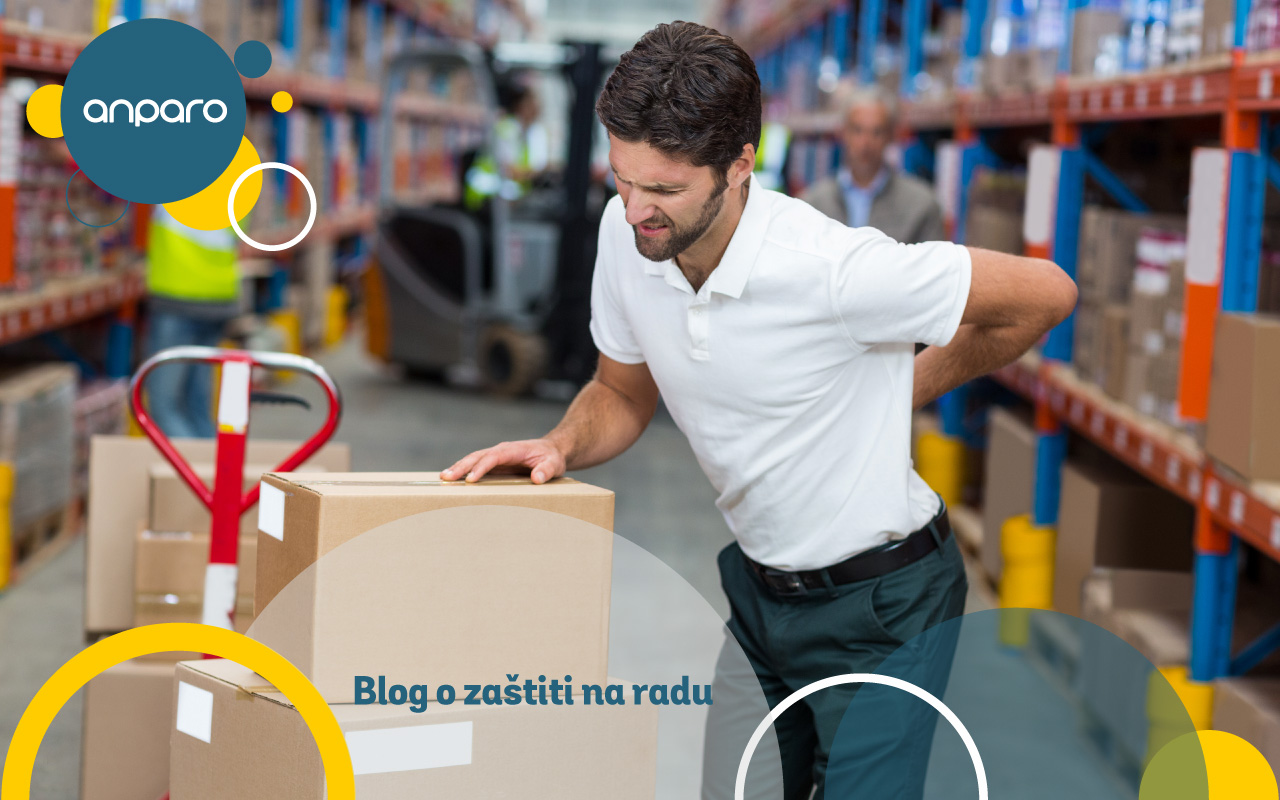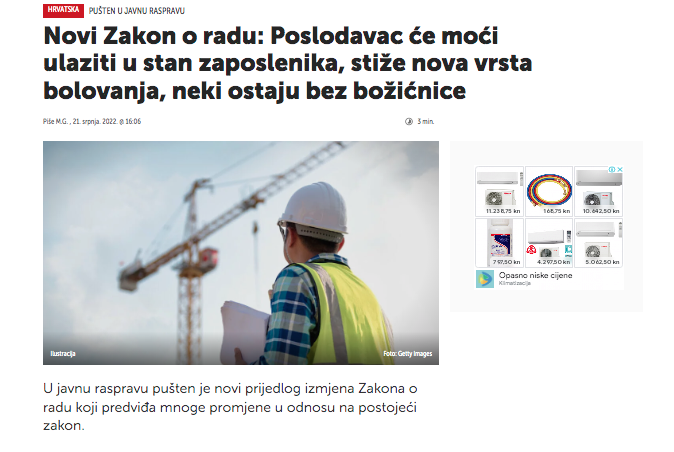
It is World Day of Safety at Work, what statistics about Croatia say
28. April 2022.
What is the cost of safety at work?
16. January 2023.OPINION ON THE NEW LAW ON LABOUR AND SAFETY AT WORK
A lot of dust has been raised in the last few days regarding the announced amendments to the Labor Law, especially about the part that touches on the regulation of work from home and the announcement that the employer will be allowed to enter the apartment of workers who work from home. At this point, it is too early to comment on something concrete because the process in occupational safety is such that this law must be passed first, after that the Ministry of Labor must give its opinion and instructions, which we will then have to apply from safety at work.

Branimir Milanković, occupational safety expert with more than 15 years of experience
In the meantime, I can write my opinion on the current situation and explain what is current now. I’m going to try to de-escalate tensions a bit, with the transfer of the current Department of Labor related to working from home, and I’m going to bold the key things:
Performing tasks at a separate place of work – opinion of the Ministry.
According to that opinion, in order to ensure a similar level of safety and health requirements in administrative, office and similar jobs when a worker periodically performs them at a separate place of work, in relation to the place of work with the employer, the employer will appropriately, in cooperation with the worker, consider the possibilities of meeting the safety and health requirements relating to those jobs and for which a small risk was previously assessed in the employer’s premises. Please also note that according to the provisions of Article 1. Ordinance amending the Ordinance on the Preparation of Risk Assessment (Official Gazette, No. 129/19), employer is not obliged to document the risk assessment for the worker periodically performs at a separate place of work, if these are administrative, office and similar jobs for which, in accordance with the provisions of the Ordinance, a small risk has been previously assessed and documented and which the worker regularly performs on the premises of the employer.
We are also of the opinion that in this space when occasionally performing administrative tasks with low risks there is no obligation to test work equipment and the working environment in terms of the provisions of the Ordinance on inspection and testing of work equipment (Official Gazette, No. 16/16) and the Ordinance on Environmental Testing (Official Gazette, No. 16/16) and that in the case when the worker himself occasionally performs administrative tasks with low risks in an apartment or house do not apply the provisions of occupational safety regulations related to evacuation and rescue and first aid provision.
The website of the Ministry of Labour and Pension System also provides an opinion on labour relations in the circumstances of the declaration of the Covid-19 epidemic and points 5, 6. and 8. in the above opinion also refers to working from home. An employment relationship is a contractual relationship between an employer and a worker, whereby the conclusion of an employment contract implies the existence of the will of both contracting parties on the essential ingredients of the employment contract, and we are of the opinion that when concluding an employment contract, the employer, in cooperation with the employee, considers fulfilling the conditions of safety at work, which in accordance with the above it may also include an inspection in the space where the worker will perform the work.
So this is the current opinion of the Ministry that with the arrival of the new Labor Code may or may not change. In the current situation, risks should be considered and jointly in cooperation with a worker working from his home to try to eliminate dangers if they exist, without having to burden yourself with actions such as risk assessment and technical testing. The current situation suggests sharing responsibilities and cooperation between employer and worker, which in my opinion is a very reasonable approach.
As for the announcements of changes, there are two changes concerning the occupational safety industry:
- Working from home will be possible if occupational safety assesses that there is a low risk of injury at work. This will not be a problem – in most cases, the office-administrative tasks that workers will perform from home will be classified into low-risk jobs (this would therefore include most forms of computer work – from bookkeeping jobs to programming).
- Employers will need to contract the conditions under which they will enter the homes of workers working from home so that they can control working conditions.
This is a problem because there are tons of outstanding questions; What if the worker definitely refuses to allow entry into his own home? What does control of working conditions mean? Are the conditions and the need to test electrical installations and the working environment (lighting and the like) implied under the control of conditions? What if the worker, for example, slips and injuries when moving around the apartment – is this considered an injury at work and a failure of the employer? In an office that is entirely under the control of the employer, these issues are clear. If we talk about working from home, where must the employer’s responsibility extend? Will this same employer have to ensure that the whole apartment meets the working conditions since none of us sits at the table for 8 hours when working from home? If yes, it pays more for employers to abolish the possibility of working from home than to cause themselves unnecessary headaches and risks.
Unfortunately, we have to wait for this law to be passed and we will see how the Ministry deals with these two sentences in practice.
I personally hope that the following approach will be supported:
- Working conditions from home must emulate working conditions in the office to a reasonable extent – if there is a need, provide the worker with an adequate table and chair that will meet ergonomic needs.
- Control of working conditions can be achieved through the creation of a simple checklist that the worker will fill out (and with his signature guarantee for its accuracy) which can be further substantiated by sending photos of the intended home workplace. In this way, everything can be solved by direct communication between employer and worker without unnecessary interference from third parties and without unnecessary entry into someone’s home.
- Create instructions for quality and safe work from home, make manuals for relief exercises and allow workers working from home access to them because the biggest problem of working from home is not the possibility of injury, but complications that arise from long-term inadequate positions in which people work at the computer – this is something you have to work on in practice if you do not want to have workers who are permanently stiff and in pain.
It is my personal opinion that this whole part about entering homes is another in a series of hyper regulations that will only needlessly complicate the situation, and I assume that you will have two approaches to the upcoming problem from authorized occupational safety companies in the future:
- Those who will eagerly accept this change and try with all their might to explain to clients that home surveillance absolutely has to be done, so these same supervisions should be charged nicely.
- Those who will try to find a solution that will be adequate and reasonable, without the employer being overly financially burdened.
Working from home, with a few exceptions, has so far been a nice privilege that workers from certain sectors could consume unhindered, so I hope that the upcoming changes will not lead employers to abolish it for fear of possible consequences. I will monitor the situation and inform you about new moments in a timely manner.
Specijalist za ovu uslugu je:

Branimir Milanković
Voditelj odjela prodaje i marketinga
s preko 15 godina iskustva


